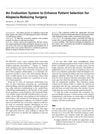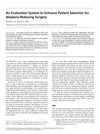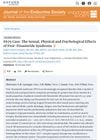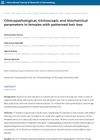8 citations,
July 2015 in “Molecular cytogenetics” A complex X chromosome rearrangement can increase the risk of multiple autoimmune diseases.
December 2021 in “BMJ Open” Androgenetic alopecia in men aged 46 is not significantly linked to depression, anxiety, quality of life, self-esteem, or sexual symptoms.
[object Object]  December 2020 in “bioRxiv (Cold Spring Harbor Laboratory)”
December 2020 in “bioRxiv (Cold Spring Harbor Laboratory)” Stress can cause a type of hair loss in mice lacking the CCHCR1 gene.
 20 citations,
February 2022 in “British Journal of Dermatology”
20 citations,
February 2022 in “British Journal of Dermatology” People with alopecia areata have a higher risk of depression and anxiety, and often face unemployment and work absences.
 21 citations,
July 2018 in “The Journal of Sexual Medicine”
21 citations,
July 2018 in “The Journal of Sexual Medicine” The 2018 update to the ED care model added a new severity score and stressed a detailed evaluation of both physical and psychological aspects.
 4 citations,
June 2005 in “British Journal of Dermatology”
4 citations,
June 2005 in “British Journal of Dermatology” People often underestimate hair loss severity, with fewer seeking treatment, and it's more distressing for women.
November 2017 in “JAMA internal medicine” Women also use 5α-reductase inhibitors for hair loss and hirsutism.
 June 2005 in “British Journal of Dermatology”
June 2005 in “British Journal of Dermatology” Women find hair loss more distressing than men and often underestimate it, needing more public awareness and professional support.
 2 citations,
January 2022 in “Aesthetic surgery journal. Open forum”
2 citations,
January 2022 in “Aesthetic surgery journal. Open forum” Aesthetic surgery can worsen depression and anxiety, especially in those with existing mood issues.
 3 citations,
September 2002 in “Dermatologic Surgery”
3 citations,
September 2002 in “Dermatologic Surgery” The evaluation system improved patient selection for hair loss surgery, leading to better results and satisfaction.
 September 2002 in “Dermatologic Surgery”
September 2002 in “Dermatologic Surgery” The evaluation system improves patient selection for hair loss surgery, leading to fewer but more successful surgeries.
 2 citations,
March 2004 in “Reviews in Gynaecological Practice”
2 citations,
March 2004 in “Reviews in Gynaecological Practice” Hormonal changes and psychological issues can cause sexual dysfunction in postmenopausal women. Behavioral therapy is recommended first, with hormone replacement helping some symptoms but not libido. Testosterone can improve libido, but its effects on overall sexual function are unclear. Emotional and relationship issues should be addressed before using medication, and the benefits and risks of testosterone supplementation should be considered.
 October 2024 in “Journal of the Endocrine Society”
October 2024 in “Journal of the Endocrine Society” Post-finasteride syndrome can cause lasting sexual, physical, and mental health issues with limited treatment options.
 30 citations,
March 2015 in “Clinical Endocrinology”
30 citations,
March 2015 in “Clinical Endocrinology” Young women with high male hormone levels or PCOS often feel more psychological distress and have a lower quality of life.
 12 citations,
January 2016 in “Endocrinology, diabetes & metabolism case reports”
12 citations,
January 2016 in “Endocrinology, diabetes & metabolism case reports” Testosterone therapy improved physical and social health in a male with 49,XXXXY syndrome.
 112 citations,
October 2005 in “Mayo Clinic Proceedings”
112 citations,
October 2005 in “Mayo Clinic Proceedings” Minoxidil and finasteride can slow hair loss and stimulate regrowth, but won't restore all lost hair or reverse complete baldness.
 12 citations,
September 2017 in “Molecular and Cellular Endocrinology”
12 citations,
September 2017 in “Molecular and Cellular Endocrinology” Testosterone significantly affects sexual desire in both men and women, but its impact on women is more complex and influenced by psychological factors.
 7 citations,
April 2012 in “Clinical investigation”
7 citations,
April 2012 in “Clinical investigation” Transdermal testosterone can improve sexual desire in postmenopausal women but lacks long-term safety data and is not FDA-approved for this use.
 162 citations,
April 2016 in “The Lancet Diabetes & Endocrinology”
162 citations,
April 2016 in “The Lancet Diabetes & Endocrinology” Testosterone therapy in transgender men has both desired effects like increased muscle mass and potential health risks such as higher cardiovascular risk.
 June 2011 in “The Journal for Nurse Practitioners”
June 2011 in “The Journal for Nurse Practitioners” Up to half of adult women may experience hair loss, and doctors should use medical history, exams, and tests to find the cause and treat it.
 May 2024 in “Brazilian Journal of Hair Health”
May 2024 in “Brazilian Journal of Hair Health” Finasteride and dutasteride may help prevent hair loss but could cause side effects like sexual dysfunction and psychological issues.
 13 citations,
May 1996 in “Archives of Disease in Childhood”
13 citations,
May 1996 in “Archives of Disease in Childhood” Siblings with signs of virilization should be tested for non-classical congenital adrenal hyperplasia, which does not affect adult height but may impact fertility and well-being if untreated.
 December 2021 in “International Journal of Research in Dermatology”
December 2021 in “International Journal of Research in Dermatology” The study concluded that female pattern hair loss is linked to psychological distress and is hard to diagnose and treat, with its causes still not fully understood.
 58 citations,
September 2012 in “Dermatologic Clinics”
58 citations,
September 2012 in “Dermatologic Clinics” Male pattern hair loss caused by follicular miniaturization; early diagnosis and treatment can reduce psychological burden.
 1 citations,
May 2017 in “InTech eBooks”
1 citations,
May 2017 in “InTech eBooks” The document explains the causes, types, diagnosis, and treatments of hair loss, and its psychological impact, especially on women.
 30 citations,
November 2012 in “Anais Brasileiros De Dermatologia”
30 citations,
November 2012 in “Anais Brasileiros De Dermatologia” Diagnosing diffuse alopecia, a hair loss condition, can be challenging and may require a scalp biopsy or tracking the disease's progression when symptoms and skin tests aren't enough.
 24 citations,
January 2015 in “Current problems in dermatology”
24 citations,
January 2015 in “Current problems in dermatology” The document concludes that accurate diagnosis of hair loss in children is crucial due to limited treatment options and the condition's psychological impact.
 September 1997 in “JEADV. Journal of the European Academy of Dermatology and Venereology/Journal of the European Academy of Dermatology and Venereology”
September 1997 in “JEADV. Journal of the European Academy of Dermatology and Venereology/Journal of the European Academy of Dermatology and Venereology” Psychological factors play a significant role in developing alopecia areata.
 March 2015 in “CRC Press eBooks”
March 2015 in “CRC Press eBooks” Telogen effluvium is a type of hair loss in women caused by many factors, and iron and thyroid tests are recommended for diagnosis.
[object Object]  10 citations,
February 2011 in “Journal der Deutschen Dermatologischen Gesellschaft”
10 citations,
February 2011 in “Journal der Deutschen Dermatologischen Gesellschaft” The document concludes that proper diagnosis and evidence-based treatments are crucial for managing hair diseases, and psychological support for patients is important.


























